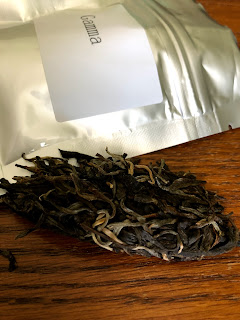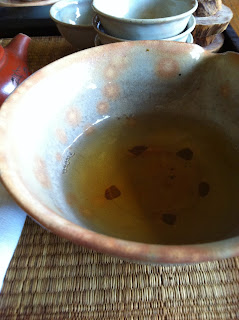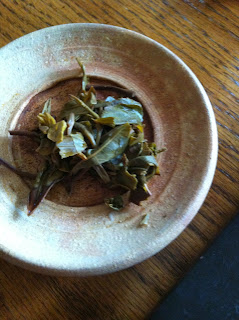This was the only one I decided to cake sample out of the
lot of samples I ordered from Yunnan Sourcing a month or so ago. This Lucy wrapper always makes my children
smile, I think it’s a beautiful thing and the reason this wrapper is one of my
favorites. Of course, the wrapper is not
why I purchased the puerh in the first place but rather the good reviews, a
nice promotional tasting video by Scott, but mainly due to the fact that I am
interested in the pressing of maocha that has been aged a bit before
pressing. Did I mention that this puerh
goes for $64.00/ 250g cake or $0.26/g.… that is pretty cheap… another reason, I
caked this sample…
This puerh was apparently found (?) as maocha by Scott one
year after it was picked in the Spring of 2017.
Scott describes the taste as a very unique taste profile. He doesn’t state weather its plantation or
gushu or anything like this maybe because he wasn’t directly involved with the
production of it… I’m not sure, but it cleanly passed the pesticide testing….
Ok let’s see what this one is all about…
The dry leaves smell of intense almost Kobucha like sour
fruitiness. There is a sweet and sour
fruit odour that is deeply penetrating.
The first infusion has a sour and dough but not sourdough
onset backed by a citrus almost grapefruit and peachy taste. There are other fruity tastes that layer this
initial profile. The mouthfeel is thick and almost astringent in the mouth and
throat and give the tea a thick and strong mouthfeeling in the first
infusion. The throat sensation is strong
and moderately deep.
The second infusion starts off with edges of fruity sour
tastes thick thick thick in the mouth and throat. The fruity taste feels really strong and is
dense and layered with sour, and bread-like tastes. There are edges of bitterness but more sour
astringency than bitter. The throat and
mouthfeel are quite stimulating. There
is some mild pungency then sour fruity tastes.
The thorat stimulation is strong, a sticky almost sandy but opening
astringency.
The third infusion starts a touch bitter and touch
astringent with a blood orange taste with nuances of peach and even
strawberry. The fruity taste and the
sour taste predominate. The mouthfeeling
is thick and coating a bit griping. The
Qi is pretty strong and pushes me into a sweat on the forehead here. The face flushes and the chest feels almost
tight. My wife comments here, “this is
powerful tea”.
The fourth infusion is mainly sour and has suggestions of
grapefruit, strawberries, sour peach, fermenting sourness, delicious sour
fruit. There is a touch of a woody thing
but the sour is thick, just kicked out some mild pungent. Mainly sour fruit, distinct and thick.
The fifth infusion has a sour, almost bitterness
happening. There is a nice creamy
returning sweetness here under the astringency, and bitterness. The fruit note is thick. The mouthnfeeling and throatfeeling is almost
sandy, sticky, and astringent. The
throat is quite stimulated with the astringency there.
The sixth infusion is getting more astringent and bitter and
the mouthfeeling is more astringent. The
fruitiness is distinct. The astringency
continues to build. The throat is almost
gripping. The Qi is an alerting type
with a tight feeling in the body, like a hug.
The seventh infusion starts of thick sour fruit, slight
woody ferment base with astringency and bitter underlying. This tea is definitely engaging and strong…
punchy. Thick mouthcoating. There is a strength about it that gets you
going, an active qi type sensation.
The eighth infusion starts a touch more fruity and the
astringency is a touch dry with less of a thick dense mouthcoating. It is almost an astringent dryness with a
fruity tone underneath.
The ninth has a much stronger fruity explosion now. It paints the tongue in an astringent fruity
note. There is some mild pungent
coolness, then returning faint creamy sweetness and more sour fruitiness. I can feel the tight Qi in the body. A tight hug, some tight chest feeling, that
is not at all bothersome but more soothing and energizing.
The 10th starts bitter but fruity and nice strawberry
almost peach like sweetness. Sometimes this
puerh tastes like cheap strawberry flavored wine. The mouthfeel is much less now, almost sandy.
The 11th becomes even bitterer and somewhat
astringent with fruit notes lying underneath.
The taste really flattens out here and never really recovers…
The 12th is bitter and sour fruit from the
onset. The fruit note is definitely
still there but the mouthfeel has lost its depth and there is an astringent
flatness to the infusions now.
The 13th is the last I attempt before putting it
into overnight infusions. It has a flat
sandy mouthfeeling, astringent throat feeling and is subtly fruity and sour underneath.
Overall, it tastes a lot like Korean Balhyocha but with much more layered
depth in the first infusions. The first
infusions are very tasty and feel quite full in the mouth. Qi here is a tight body feeling and some
stimulating power. The stamina here is
not good leading me to believe that this is likely terrace/ plantation Jingmai. On the plus side, It comes with a really nice
price tag and I quite enjoy the taste, mouthfeeling, and Qi of the first
handful of infusions. It comes on strong.
The above session
I leafed it real hard. I’ve had a chance
to steep this puerh a few times and it seems to be better leafed a bit lighter
due to its strength and bitter astringency.
Overall a nice puerh, a bit unique for its price…
Peace






























